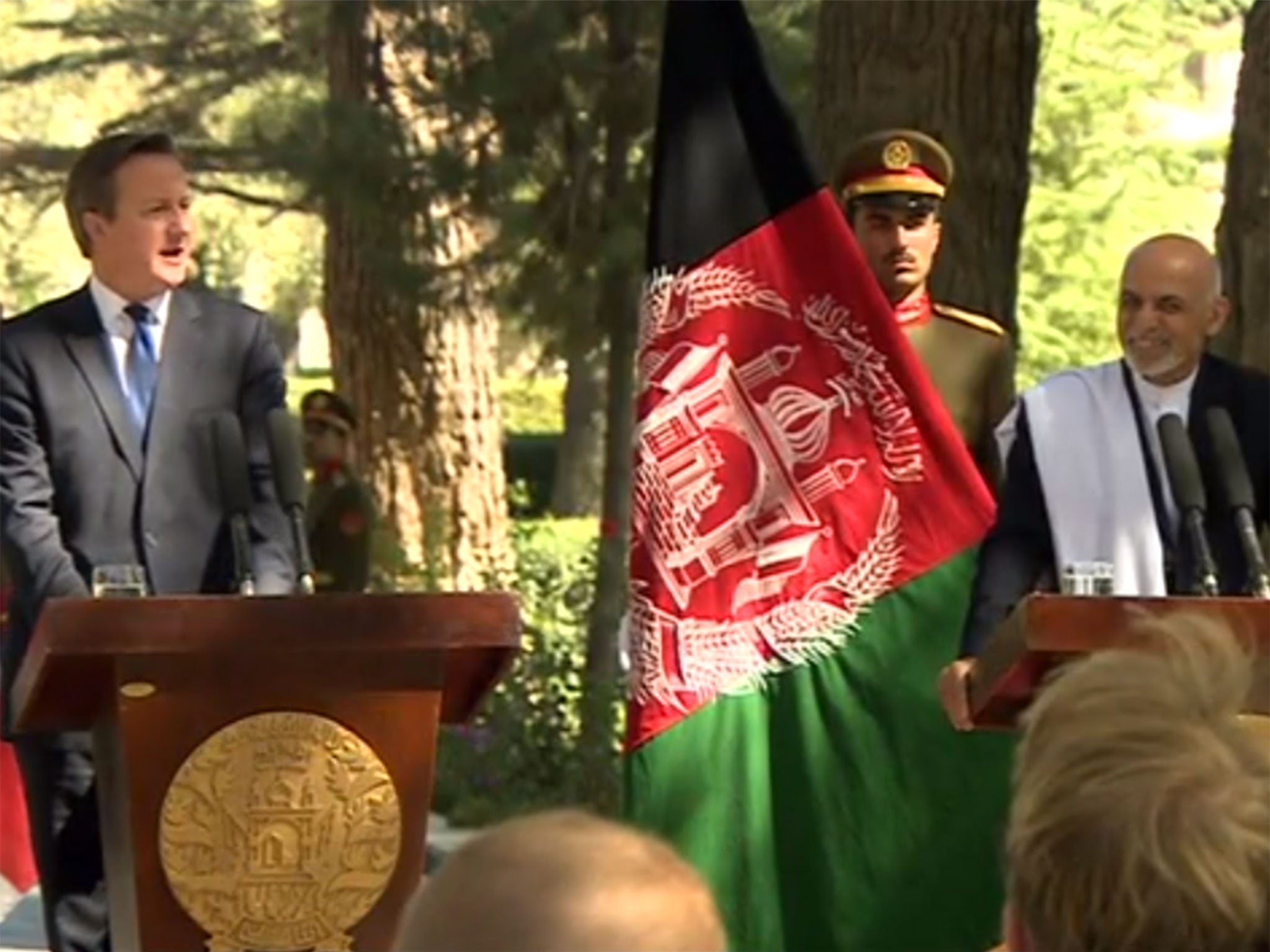David Cameron lands in Kabul for Afghan talks
PM is holding bilateral talks with the new Afghan President Ashraf Ghani and his defeated Presidential rival Abdullah Abdullah

Your support helps us to tell the story
From reproductive rights to climate change to Big Tech, The Independent is on the ground when the story is developing. Whether it's investigating the financials of Elon Musk's pro-Trump PAC or producing our latest documentary, 'The A Word', which shines a light on the American women fighting for reproductive rights, we know how important it is to parse out the facts from the messaging.
At such a critical moment in US history, we need reporters on the ground. Your donation allows us to keep sending journalists to speak to both sides of the story.
The Independent is trusted by Americans across the entire political spectrum. And unlike many other quality news outlets, we choose not to lock Americans out of our reporting and analysis with paywalls. We believe quality journalism should be available to everyone, paid for by those who can afford it.
Your support makes all the difference.David Cameron today landed in Kabul for the last Prime Ministerial visit to Afghanistan while Britain still has 'boots on the ground' in the country.
UK combat forces are due to pull out entirely within weeks - after a thirteen year campaign that has cost the lives of 453 servicemen and women.
Work is almost complete dismantling Camp Bastion which was once home to 28,000 people and all that will remain of a British presence in the country will be an UK run Afghan army officer training centre on Kabul.
During the visit Mr Cameron is holding bilateral talks with the new Afghan President Ashraf Ghani and his defeated Presidential rival Abdullah Abdullah who is now the country's Chief Executive.
Mr Cameron will announce that Britain is going to provide £178 million a year in aid until 2017 to support health and education programmes.
Next month Mr Cameron will also co-host a London Conference on Afghanistan to secure continued support from the international community for Afghanistan's development.
During a press conference with the two leaders the Prime Minister also suggested that Britain would accept the Taliban being brought into the new government if it renounced violence.
“If the Taliban want to secure a role in the future of Afghanistan then they must accept that they have to give up violence and engage in the political process,” he said “That is a way to have a voice in this democratic country.”
Speaking ahead of the talks Mr Cameron, who has visited the country 13 times both as leader of the opposition and Prime Minister, said he believed that despite the high price paid in blood and treasure the mission had been both necessary and worthwhile.
“I think we have done vital work here but we should remember those who have paid the ultimate price and those that have been injured from the work they did here,” he said.
“When you compare Afghanistan in 2001 with Afghanistan today the country has been transformed.
”If you think in bald British term what we've been trying to achieve that has been to deny a safe haven to Al Qaeda and create a situation where the Afghans were capable of their own security without the presence of foreign troops.
“We have gone a long way to achieving that.”
“This was the place where the 9/11 attacks were planned. This is the place where countless attacks were planned.
”When I came Prime Minister nine out of ten plots that we faced on the streets of Britain came from Afghanistan Pakistan area.
“That is now well down - somewhere below half are the latest figures I have seen so I think that is a very real achievement.”
And he said he was confident that even without a significant US or British presence in the country that could be maintained.
“You've got a country that has gone from having had no army that now has a capable army - having had no police now it has capable police.
”The core UK mission was about our own domestic security and that required an Afghan army capable of taking care of Afghan security and denying a safe haven for Al Quaeda and huge progress on that has been made.“
Asked about the lessons to be leant from the conflict Mr Cameron said it was clear that military measures alone would not be enough to defeat Islamic extremists.
”The lessons from Afghanistan are that in all these interventions you need to make sure you have a combined military, diplomatic, political and aid programme.
“That's not always been perfectly aligned in Afghanistan but I think you can see that now.
”The promise I made in 2010 that all our combat troops would be out by 2014 is being kept. But that does not mean we are leaving this country to its own devises. We have a huge aid programme that will continue. We're going to continue to pay our share towards the Afghan security forces. We have established the officer traing academy in Kabul.
“We are fighting a generation struggle against Islamist extremist terrorism. This is a battle we are going to be engage in for many many years. The lessons are that you need to use everything at your disposal - diplomacy, politics, aid, regional relations but also the military has a role.”
President Ghani thanked the families of British troops who died or were injured in Iraq.
"We say thank you to the families of the loved ones who died who stood shoulder to shoulder with us. We will remember them.
But he added the British mission in Afghanistan had not only secured his country's future.
"Your presence has meant London is safe as well."
Join our commenting forum
Join thought-provoking conversations, follow other Independent readers and see their replies
Comments